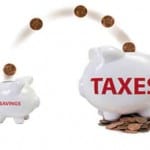Scottish Tory leader publishes tax return

Do you need a tax return completing in Glasgow? If Ruth Davidson can, so can you.
Simply register with us and we will take care of all the hard work..
Scottish Conservative leader Ruth Davidson has published her tax return ahead of the Prime Minister.
The unprecedented release of her personal finance details follows the furore about Mr Cameron's shares in an offshore fund set up by his father Ian, revealed in the Panama Papers leak.
Tax Return Specialists.
Ms Davidson's tax return reveals she earned £52,223 in the financial year 2014-15 and paid £10,513 in tax.
The documents she owed £3.20 in tax for that financial year as of January 2016.
The figures reveal total of £10,358 of her income was taxed at the higher 40% rate.
Her tax return shows she received #12,085 in benefits and expenses to cover her office costs which were deducted for tax purposes.
David Cameron has confirmed he will publish his tax returns and said he botched the handling of the row over his financial affairs.
Speaking at the Conservative Party's spring forum in central London, he said: ``It has not been a great week. I know that I should have handled this better, I could have handled this better.
``I know there are lessons to learn and I will learn them.
``Don't blame Number 10 Downing Street or nameless advisers, blame me.''
Labour leader Jeremy Corbyn said he would publish his own tax return ``very, very soon''.
Ms Davidson released her tax return after the Scottish Labour leader published hers and challenged other party leaders to do the same.
A Labour spokesman said: ``The Panama papers showed that the rich elite are playing by different rules from the rest of us.
``Following the shocking revelation that the Prime Minister has benefited from money hidden away in tax havens, it's more important than ever for all political
leaders to be transparent about their finances.
``So today we publish Kezia Dugdale's tax returns and challenge other Scottish party leaders to do the same.''
The returns show Ms Dugdale had an income of £57,465 in 2014-15 and was charged £11,250.40 tax.
A total of £4,282 benefits and expenses for office costs was deducted for tax purposes, £5,242 was classified as ``profit from self employment'' through Ms Dugdale's newspaper columns although the cash goes directly to charity MND Scotland.
The amount outstanding as of January 2016 was £743.40 in tax for the newspaper columns.
Starbucks pays UK corporation taxes of £8.1m
Starbucks and Taxes. Payment nearly matches total contributions paid over past 14 years but critics call for coffee chain’s accounts to be more transparent

Starbucks paid nearly as much corporation tax in 2015 as it did in its first 14 years in the UK, after bowing to pressure to scrap its complex tax structures.
However, it still faced criticism for a lack of transparency that makes it hard to determine whether it is paying a fair amount of tax on its coffee and espressos.
The Seattle-based coffee house posted a pre-tax profit of £34.2m for the year to the end of September, up from £2m the year before.
The improvement came despite a dip in sales from £409m to £405m, as it offset the revenue decline by cutting expenses and selling company-owned stores to franchisees.
CORPORATION TAX
It also paid £8.1m in corporation tax at a rate of 24%, above the UK corporation tax rate of 20% due to a one-off change in accounting practices.
The tax contribution for 2015 was only slightly less than than the £8.6m it paid over the 14 years after its 1998 UK debut, despite £3bn worth of sales in that time.
Starbucks became the poster child for corporate tax avoidance in 2012 after details of its meagre tax contribution emerged. It was accused of using artificial corporate structures to shift profits out of the UK into lower tax jurisdictions.
HMRC DEDUCTIONS
The furore prompted a deal with HMRC to waive tax deductions and pay £20m in voluntary corporation tax over two years, including £11.2m last year.
Starbucks has also shut down a UK company that was part of a labyrinthine network designed to cut taxes at its former European office.
Elements of its European tax structure were ruled unlawful by the European commission in October, with millions of euros of fines expected to follow
Want us to help with your tax return? Go straight to the home page.
Read the full guardian article
LETTER OF ENGAGEMENT
LETTER OF ENGAGEMENT.
Below you will find a summary of the service that will be provided in our capacity as your tax agent.
WHAT WE WILL DO
1. We will endeavour to ensure that you and your work/business activities are fully up to date with all matters concerning the production and submission of your annual self assessment tax return as submission agents only. We will advise you of any deadlines that you must meet and assist you in ensuring that your tax liabilities are accurate, efficient and take full advantage of your entitlements and allowances as per current HMRC regulations.
2. We will, after initial registration as a client, if instructed by you, liaise with HMRC on your behalf and carry out an overview of your past historical annual tax returns, going back a period of four years.
3. If instructed by you, we will look to prepare and submit an application for overpayment relief going back a period of four years and request therein to HMRC that all overpaid tax formerly subjected to our client be repaid forthwith by way of a tax rebate.
4. We will accept from HMRC on behalf of our clients, all paid and repaid amounts into our working bank account. From there all amounts will be electronically transferred to our clients after our commission/fees are deducted.
5. We will accept from HMRC on behalf of our clients, all correspondence pertaining to our clients affairs and endeavour to notify our client when contents of said correspondence require actioning by our client.
Why do we need a letter of engagement.
A letter of engagement in the interests of clarity is vital. Sure, most people have a vague idea of what a tax agent does for them but it is crucially important that you receive and review the letter, so that you fully understand the engagement. So, you see, full clarity. Totally in your interests.
WHAT WE WILL NOT DO
6. We will not offer our client any advice pertaining to avoiding their full responsibilities regarding the taxation of their work/business activities.
7. We will not comply with any attempt to falsify or subvert any information or calculation thereof to be submitted to HMRC that is presented to us by a client. Any client in breach of this will be deleted from our records.
8. We will not carry out any audit of a clients bookkeeping or accountancy records for the purposes of a clients legal duties.
9. We will not act as a clients accountant or tax advisor. Our role is strictly as a tax agent pertaining to the matters mentioned. (points 1 - 5)
10. We will not take responsibility for the accuracy and efficiency of a clients record keeping or for the accuracy of any figures presented to us as agents from a client for the purposes of presentation to HMRC. All such figures are ‘assumed’ to be accurate in accordance with a clients records and suitable for presentation to HMRC. The responsibility for the accuracy of figures derived from a clients records is entirely the clients.
In the interests of clarity.
Terms of engagement. Interests of clarity. Tax client.
WHAT YOU MUST DO
11. You are asked to answer any questions we have from time to time to put to you, either via telephone, in writing, or via email honestly and accurately, and accept that we will submit any figures you give us, either via telephone, in writing, or via email to HMRC on your behalf on the ‘assumption’ that they are honest and accurate and correspond with your own internal business and work record keeping activities. You fully accept that the responsibility for the accuracy of afore mentioned figures used by ourselves on your behalf is entirely your own.
12. You are required to take responsibility for the safe keeping of your work/business records for a period of six years following the submission of any matters pertaining to figures contained within such records.
13. You are asked to cooperate with us by responding to any communication from us either via tax, telephone, email or in writing within a reasonable amount of time.
14. You accept that once an emailed instruction from you to us to submit a tax return is received that will be interpreted as your approval and instruction to us to submit to HMRC.
15. You accept and acknowledge that the format of our agent relationship with you the client is that you will never at any point be asked to ‘pay’ us any money. Any fees for the appropriate service owed to us will be deducted from any rebates that are forthcoming to you. Standard tax rebate commission 25%. Historical submissions £500. Tax return £299. Processing £100. Tax investigation £499. Telephone advice free of charge. Example. Client with one years annual tax return resulting in tax rebate of £10,000. Fees - 25% @ £2500. admin @ £299. processing @ £100. Total deducted from rebate - £2899. Total paid to client - £7101.
These are the terms of our letter of engagement to all clients.
And remember, at no point will you have to put your hand in your pocket. Simply to press the 'claim now' link on this page and fill out your details and then press send. And that's it.
To get started? Simply click CLAIM NOW.
USEFUL LINKS.
GOV UK
HMRC
CURRENT TAX RATES
www.selfemployedtaxback.com
REGISTER YOUR NEW BUSINESS
www.selfemployedtaxback.com. Striving for efficiency and maximum gain for clients in all matters concerning self employed tax rebate matters, CIS tax rebate matters, in addition to complete year round support for self employed tax return and CIS tax return administration. ALL on a no rebate - no fee basis.
HOUSING MARKET CRASH. Look out, we are heading for a housing market crash again', warns William White, the central banker who predicted 2008 crisis
World faces a crunch that could see a collapse in London housing prices.

Leading Economist predicts another Housing Market Crash
Housing Market Crash. Despite 2008 crash being caused by debt, the levels have since risen
Overall debt has gone from 200% of global GDP in 2007 to 250% now
The world is facing a new crisis caused by an explosion in debt. So warns William White, the central banker who famously predicted the crisis of 2008.
Housing Market Crash. As financial markets reeled last week and fears of a fresh recession or even banking crisis sparked panic, White was more than willing to issue yet another prophecy of doom.
The world is now facing a crunch that could see a collapse in property prices, including those in London; a new global banking crisis; waves of cheap commodities savaging Western industrial centres; and the need for debts to be written off on a grand scale.
But why another Housing market Crash?
Housing Market Crash. Rather than being better placed to survive, the world is actually worse off than it was in the 2008 crash, he argues.
‘At each stage what’s been happening is the imbalances in the global economy have been getting worse and worse.’ And the housing market suffers.
White issued his first warning to central bankers in 2003 at their regular meeting at America’s Jackson Hole. At the time White was economic adviser to the Swiss-based Bank of International Settlements – often dubbed ‘the central bankers’ central bank’.
Housing Market Crash. White now works part-time at the equally prestigious Organisation for Economic Co-operation and Development, but Britain has played a significant role in his life.
Although Canadian-born, he attended the University of Manchester and his first job was as an economist at the Bank of England.
And the 72-year-old has particular warnings for the UK, notably on its property market and the risk to British industries such as steel. But the picture he paints is of a fresh global crisis.
Cheap money has led to an explosion in debt, taken on by governments, households and companies – and despite the 2008 crisis being caused by too much debt, the levels have risen since, he says.
Does everyone get a housing market crash?
Housing Market Crash. Overall debt has gone from 200 per cent of global GDP in 2007 to 250 per cent now. The deleveraging hasn’t happened,’ he said, by which he means companies, households and governments have not paid back enough debt to be ready for the next crisis.
Britain – and London in particular – could be vulnerable in relation to house prices.
‘Property prices particularly in some bigger places like London, Sydney and Paris would be deemed on the rich side.’
‘Look at China where they have got massive overcapacity in steel, glass, ceramics. They are going to send this our way, you can already see this with the closure of the steel plants and mills,’ he says, referring to closures of a number of British steelmakers within the past few months.
Britain’s banking system could come under pressure too, he says, even though Britain has done more than most countries to ensure its banks have set aside bigger capital buffers to cope with disaster.
‘The next question is the extent to which the financial system is now vulnerable to the bankruptcy of some of these companies.’ White is convinced a debt reckoning is coming; he is less sure, however, when it will happen. He admits he has repeatedly thought a crisis would come sooner, and that recessions are impossible to predict.
‘What you can say is that everywhere you look, what you see is economies labouring under growing difficulties. You can see potential trigger points, but there are real limits to our understanding. Predicting exactly what will happen and when is impossible.’
He also admits that in the past he has underestimated the extent to which central banks can reinvigorate economies with dramatic interest rate cuts.
But, he argues, that today there is one reason to think central banks, including the Bank of England, may have reached the limit of their powers. With most central bank interest rates close to zero, there is little room for more action.
In the UK rates are at 0.5 per cent. Some have raised the idea of further cuts in rates, including the Bank of England’s own chief economist Andy Haldane. White, in fact, singles out Haldane for praise saying he is ‘thinking very much outside the box’ and has ‘understood the complexity’.
Some, though as yet no one at the Bank of England, have even raised the idea of negative rates in the UK (in effect charging banks to put money on deposit at the Bank of England). Negative rates are already in place in a number of countries including Japan and Sweden.
White warns, however, they may actually make matters worse. ‘I am not sure I want negative rates to work. It’s the last refuge of the scoundrel,’ he says.
The point he argues is that low rates – and negative rates even more – may make a banking crisis more likely rather than less.
Banks will be charged to leave cash at central banks but may not realistically be able to charge ordinary customers for putting cash on deposit. They would need to make up the profit somewhere else.
‘It squeezes bank profit margins, so they might charge more to borrowers, which would be the opposite of what low interest rates might be expected to do.’
The recent economic worries and the slump in stock markets and commodity prices have been widely laid at the door of China and other emerging economies whose breakneck growth may finally be slowing.
For White it is again the debt these economies have built up – mostly borrowed in dollars – that is part of the threat.
‘The total US dollar denominated credit to non-banks in the emerging markets is $3.3 trillion (£2.3 trillion). That’s up from less than $1 trillion (£690 million) at the beginning of the century. It has exploded since 2009. In Brazil and China that debt has gone from 150 per cent of GDP to 200 per cent of GDP.’
It would appear that there's no better time for a tax rebate.
To get started? Simply click CLAIM NOW.
USEFUL LINKS.
GOV UK
HMRC
CURRENT TAX RATES
www.selfemployedtaxback.com
REGISTER YOUR NEW BUSINESS
History of Income Tax
OK, so what is the actual history of income tax. I mean, why do we have to pay it. Right? Who's bright idea was it? Read on to find the culprit
INCOME tax was introduced by William Pitt the Younger nearly 200 years ago to finance the struggle against Napoleonic France. Subsequent wars have brought big changes in tax.
The schedules of the new tax listed sources of income. The list began with property, moved on to woodlands, through trade, profession or vocation, Crown appointments and ended with a final catch-all for income which did not come within any of the other categories. In a history of the tax system, John Kay wrote: "The idea that employees were people of sufficient standing to be liable for income tax was not conceived of." Yet that catch- all now catches most of us.
In Victorian Britain it caught few people. Aside from the burden of running a blue-water navy, this was the era of the nightwatchman state. There was only one rate of income tax and the highest it reached was 62/3 per cent, during the Crimean War. In the mid-19th century, there were fewer than half-a-million taxpayers.
As Chancellor, William Gladstone described income tax as "an engine of gigantic power for great national purposes" - though he aspired to abolish it. But the engine was running at low power even at the start of the 20th century, when the Inland Revenue still had fewer than a million taxpayers in its trawl. The first step to progressive rates of income tax came with Lloyd George in his "people's budget" of 1909. His "supertax" was only eight per cent - charged on incomes equivalent to more than pounds 200,000 in today's money. But in the First World War top rates rose to over 50 per cent.
On the eve of the Second World War, those paying income tax still amounted to less than one in five of the working population. By the end the number of taxpayers had tripled to 12 million and the pay-as-you-earn system was devised, though the Inland Revenue had insisted that deducting tax before income was paid could not be done.
Today 25,700,000 people pay income tax, which accounts for a quarter of government revenue.
Also, for more information, follow this link for more TAX HISTORY.
History of Income Tax
Would you prefer to have some money in your pocket instead of a history lesson? Just get in touch to claim your tax rebate now.
And remember, at no point will you have to put your hand in your pocket. Simply press the 'claim now' link on this page and fill out your details and then press send. And that's it.
To get started? Simply click CLAIM NOW.
USEFUL LINKS.
GOV UK
HMRC
CURRENT TAX RATES
www.selfemployedtaxback.com
REGISTER YOUR NEW BUSINESS
www.selfemployedtaxback.com. Striving for efficiency and maximum gain for clients in all matters concerning self employed tax rebate matters, CIS tax rebate matters, in addition to complete year round support for self employed tax return and CIS tax return administration. ALL on a no rebate - no fee basis.

